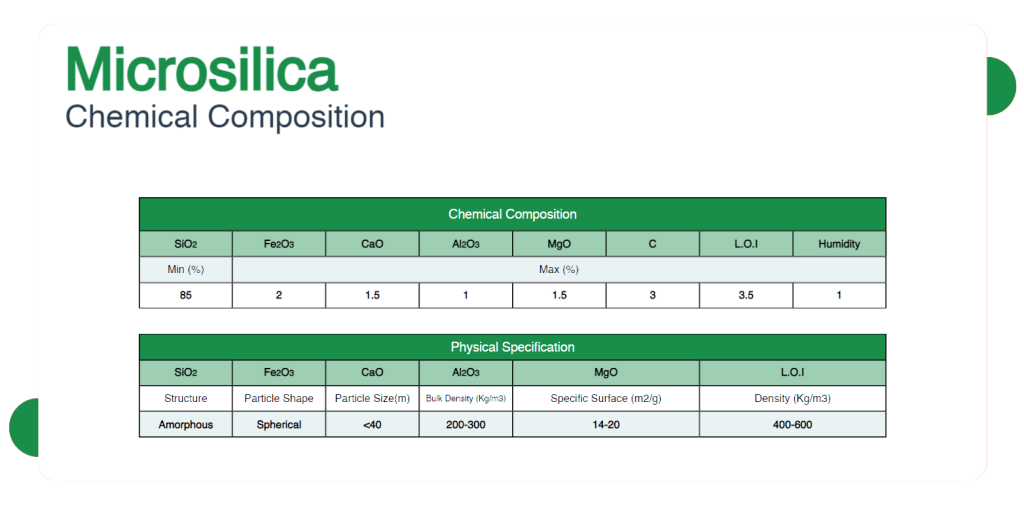Flammability
No
major substance
SiO2
melting point
Vary
boiling point
Vary
volumetric mess
0.4 to 0.6
Specific surface area
14 to 20
SiO2
Silicon dioxide
LOI
Loss on ignition
MgO
Magnesium oxide
C
Carbon
Fe2O3
Ferric oxide
CaO
Calcium oxide
Al2O3
Aluminium oxide
What is Microsilica?
Microsilica powder is a byproduct of the Ferrosilicon production process, comprising spherical particles with a diameter of less than 40 micrometers. Primarily, it is used as a pozzolanic material to enhance the properties of high-performance concrete. Additionally, Microsilica powder finds applications in various industries, including refractory, ceramic, rubber, coating, and others.

Applications
Waterproof Concrete Production
Microsilica enhances the density and impermeability of concrete by filling voids and pores, thereby preventing
High-Strength Concrete Production
Microsilica improves the bond between cement and aggregates, leading to increased hydration of cement and higher compressive, flexural, and tensile strength of concrete.
Shotcrete
Enhances cohesion and adhesion of shotcrete, reducing rebound and dust generation during spraying
Concrete Stability Enhancement
Protects concrete from environmental attacks such as sulfate, acid, chloride, and freezing, enhancing its durability and longevity.
High-Temperature Coatings
Increases heat resistance and insulation of coatings, preventing cracking and peeling at elevated temperatures
Filler for Organic Materials
Improves mechanical properties, thermal stability, and electrical conductivity of organic materials such as rubber, plastic, and adhesives.
• Used in Coatings, Paints, Plastics, Adhesives, Rubber, and Ceramics: Microsilica enhances various properties of these materials, including strength, durability, and thermal resistance.

Laboratory Parameters
Common physical and chemical properties of Microsilica include:
- Melting Point: Varied depending on application and physical properties.
- Boiling Point: Varied depending on application and physical properties.
- Appearance and Color: Spherical particles with an average diameter of 40 micrometers, gray in color.
- Odor: Odorless
- Solubility: Insoluble in water.
- Combustibility: Non-combustible.
- Volumetric Mass: Density ranges from 0.4 g/cm³ to 0.6 g/cm³.
- Specific Surface Area: Varies from 14 to 20 square meters per gram.

Advantages of Using Microsilica
Microsilica exhibits high pozzolanic activity, reacting with calcium hydroxide in the presence of water to form Calcium Silicate Hydrate (C-S-H), the primary binding agent in concrete. This reaction significantly improves the strength, durability, and impermeability of concrete structures.

Packages
Produced Microsilica by Iran’s ferrosilicon factory can be sold in the following two ways based on the type of granularity, volume and customer demands:
- Bag – 40 Kg
- Big Bang – 1000 Kg

